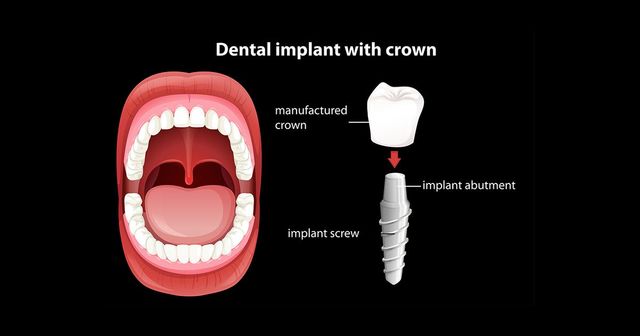Are Crowns Considered Major Dental? Discover the Impact on Your Oral Health

Yes, crowns are considered a major dental procedure due to their significant impact on tooth restoration and overall oral health. In addition to providing structural support and preventing further damage to a compromised tooth, crowns also offer cosmetic benefits, improving the appearance of the smile.
Furthermore, crowns are typically used in cases of severe tooth decay, extensive fractures, or after root canal therapy. The process involves removing a portion of the damaged tooth, shaping it to accommodate the crown, and cementing the custom-made restoration in place.
With proper care and maintenance, crowns can last for many years, ensuring long-term dental health and preserving the functionality and aesthetics of the smile.
1. Understanding The Importance Of Dental Crowns
Dental crowns are an essential part of restorative dentistry, playing a crucial role in maintaining oral health and improving the functionality of teeth. Designed to restore and protect damaged or weakened teeth, crowns are often considered a major dental treatment.
Purpose and function of dental crowns:
Crowns are custom-made caps that are placed over a tooth to restore its shape, size, and strength. They provide structural support to weakened teeth, protecting them from further damage or decay. Crowns also enhance the aesthetics of a smile, improving the appearance of discolored, misshapen, or severely worn teeth.
Types of dental conditions that may require crowns:
Crowns are typically recommended for teeth that have undergone a root canal or have large fillings, cracks, fractures, or significant decay. They are also used in dental implant procedures to replace missing teeth, providing a sturdy foundation for the prosthetic tooth.
How crowns contribute to oral health improvement:
By protecting damaged teeth, crowns help prevent further infection or decay. They restore the normal functionality of teeth, allowing individuals to chew and bite without discomfort. With proper oral hygiene and regular dental check-ups, crowns can provide long-lasting solutions for maintaining oral health.
2. Exploring Different Types Of Dental Crowns
html
Dental crowns are commonly used in restorative dentistry to address various dental issues. There are several types of dental crowns available, each with its own unique benefits.
Porcelain crowns offer the advantage of being able to closely mimic the natural appearance of teeth, making them a popular choice for individuals seeking a seamless smile. The aesthetic appeal of porcelain crowns is enhanced by their ability to resist staining, ensuring a beautiful and durable restoration.
Metal crowns, on the other hand, are known for their exceptional durability. They are often recommended for restoring molars as they can withstand the intense chewing forces exerted on these teeth. Although metal crowns may not match the natural color of teeth, they are strong and long-lasting.
Ceramic crowns are preferred by many individuals who desire a natural-looking option. They are specially crafted to match the shade and translucency of the surrounding teeth, providing a seamless and aesthetically pleasing result. Ceramic crowns are highly biocompatible and are considered a reliable choice for restoring front teeth.
Composite resin crowns offer excellent cosmetic appeal and are often used for their ability to closely match the color of natural teeth. While they may not be as strong as metal or ceramic crowns, composite resin crowns offer a more conservative restoration option.
3. The Impact Of Dental Crowns On Oral Health
Are Crowns Considered Major Dental?
Dental crowns are an essential part of maintaining good oral health. They serve multiple purposes in protecting and restoring damaged teeth. Firstly, they provide protection by covering and encasing a tooth that has suffered significant decay or damage. This prevents further deterioration and prevents the need for extraction. Secondly, crowns strengthen weak teeth by reinforcing their structure and preventing fracture. They are commonly recommended after root canal treatment to ensure the tooth’s longevity. Thirdly, crowns improve the overall bite and dental alignment, allowing for better functionality and aesthetics. They are often used in cosmetic dentistry to enhance the appearance of misshapen or discolored teeth, resulting in a more confident smile. With their numerous benefits, dental crowns play a major role in enhancing and maintaining oral health.
The Impact of Dental Crowns on Oral Health
| Protection and restoration of damaged teeth | Prevention of further decay and damage | Strengthening weak teeth | Improvement of overall bite and dental alignment |
|---|

Credit: www.fingerlakesfamilydental.com
4. Considerations For Getting Dental Crowns
Dental crowns are commonly used in restorative dentistry to repair damaged or decayed teeth. They are considered a major dental treatment due to their extensive use in repairing and restoring tooth structure. Before getting a dental crown, a thorough dental examination and diagnosis are necessary to assess the condition of the tooth and surrounding tissues. This helps determine whether a crown is the appropriate treatment option.
When it comes to choosing the right dental crown material, there are several options available, including metal, porcelain fused to metal, all-ceramic, and zirconia crowns. The choice depends on factors such as durability, aesthetics, and cost.
Preparing for the crown placement procedure involves removing a portion of the tooth enamel to create space for the crown. This is followed by taking impressions of the tooth and sending them to a dental laboratory for crown fabrication. Temporary crowns may be placed during this period.
After the crown is placed, proper aftercare and maintenance are crucial to ensure its longevity. This includes practicing good oral hygiene, avoiding hard and sticky foods, and scheduling regular dental check-ups. Taking these considerations into account will help ensure successful dental crown treatment.
5. Cost And Insurance Coverage For Dental Crowns
When it comes to dental crowns, the cost can vary depending on several factors. Some of the factors that affect the cost of dental crowns include:
- The material used for the crown: Different materials, such as porcelain, metal, or a combination of both, can have different costs.
- The size and location of the tooth: The complexity of the procedure and the tooth’s position in the mouth can affect the cost.
- The dentist’s expertise and location: Dentists with more experience or practicing in urban areas may charge higher fees.
Insurance coverage for dental crown procedures can also play a role in the overall cost. Some dental insurance plans may cover a portion of the cost, while others may not provide coverage at all. It’s important to check with your insurance provider to understand your specific coverage.
If you don’t have insurance coverage or if the cost is not fully covered, there may be alternative payment options and financing plans available. Some dental offices offer payment plans or accept third-party financing options, allowing you to manage the cost of your dental crown over time.
6. Risks And Limitations Of Dental Crowns
Risks and Limitations of Dental Crowns
Potential risks and complications that may arise with dental crowns include:
- Allergies to dental crown materials
- Long-term effects and durability of crowns
Allergies to dental crown materials can occur in some individuals, leading to discomfort or adverse reactions. It is important for dentists to consider the patient’s medical history and potential allergies when selecting crown materials. Additionally, the long-term effects and durability of dental crowns can vary depending on factors such as oral hygiene, diet, and overall dental health. While dental crowns are designed to be durable, they may require replacement or repair over time due to wear and tear. Regular dental check-ups and proper maintenance can help prolong the lifespan of dental crowns.
Frequently Asked Questions On Are Crowns Considered Major Dental?
Is A Crown Basic Or Major Restorative?
A crown is considered a major restorative treatment for a damaged tooth.
Are Crowns Considered Major?
Yes, crowns are considered a major dental procedure. They are used to protect damaged teeth and improve their appearance.
Are Crowns General Dental?
Yes, crowns are commonly used in general dentistry to restore damaged or decayed teeth. They are tooth-shaped caps made of materials like porcelain or metal and are placed over the affected teeth to protect and strengthen them.
Is Root Canal Considered Basic Or Major?
A root canal is considered a major dental procedure.
Conclusion
Crowns are indeed considered major dental procedures due to their extensive treatment and impact on oral health. From protecting damaged teeth to improving aesthetics, crowns play a crucial role in dental care. Therefore, it is essential to consult a professional dentist to understand the complexity and benefits of receiving a crown.
Regular dental check-ups and proper oral hygiene can help individuals maintain the longevity of their crowns and overall dental well-being.




